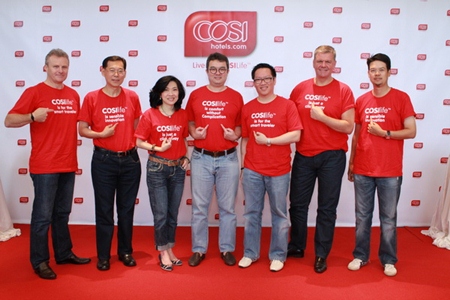Centara Hotels & Resorts has recently announced the launch of a new hotel brand, COSI Hotels, designed for cost-conscious travellers who mostly do all their own bookings on-line and who are searching for pocket-friendly accommodation prices.
The first COSI Hotel is projected to open in 2015 and Centara plans to have at least 30 operational by 2020.
Thirayuth Chirathivat, Chief Executive Officer of Centara Hotels & Resorts, said that the COSI brand has been developed in response to rapid economic expansion within the Asia Pacific region, which is increasing the volume of both domestic and international journeys.
 Staff and management of Centara Hotels & Resorts including Chief Executive Officer Thirayuth Chirathivat (center) and Vice President of Business Development, Suparat Uahwatanasakul (3rd right), pose for a photo in Bangkok during the official launch of the COSI Hotels brand.
Staff and management of Centara Hotels & Resorts including Chief Executive Officer Thirayuth Chirathivat (center) and Vice President of Business Development, Suparat Uahwatanasakul (3rd right), pose for a photo in Bangkok during the official launch of the COSI Hotels brand.
“There is an enormous growth in travel, and the significant growth of low-cost airlines is allowing people to travel more easily and conveniently,” he says.
“Travelling by low-cost airline in the ASEAN grouping currently accounts for 51 percent of the aviation industry in the ASEAN. Further, the Asean Economic Community or AEC will be implemented two years from now adding further demand.
“These factors are leading to the need for convenient accommodation and also value for money.
“Centara Hotels & Resorts sees a great opportunity to develop a new brand to cover this economic segment, and we are now in the process of brand and product development for COSI Hotels.”
Thirayuth added that “dot com” has been added to the brand logo because marketing and sales will be primarily through websites.
“We expect our first COSI Hotels property to open on 2015,” he said. “We plan to have at least 30 hotels in 2020, which is forecast to generate an income of around 2,200 million baht and income from management fees of 180 million baht,” said the Centara CEO.
Suparat Uahwatanasakul, Vice President of Business Development at Centara International Management Co., Ltd, explained the meaning of COSI as:
C is Comfortable – feel comfortable both with the room and facilities of the hotel.
O is Open – the product is easy to understand and affordable.
S is Sensible – sensible and friendly prices and eco-friendly designs.
I is Individual – welcome all travellers.
A friendly logo is designed to carry this message. COSI customers can be divided into four groups as follows:
Age 16-29: University students or graduate students who are just starting their career. Travel alone or in groups.
Age 50 and above: Retired people or couple travellers who like technology.
Family groups who like easy and convenient journeys and value for money.
Corporate groups who travel for business purposes and are looking for a more limited service and a friendly price.
“For the room rate, it depends on each location,” said Suparat. “However, the average room rate will be approximately 1,000-1,250 baht per night. Pricing strategy will be for dynamic pricing, which depends on booking periods and booking conditions.
“Our marketing concept is “COSI LIFE” where you feel comfortable and relaxed as an overall experience while staying at COSI, along with a friendly price and other facilities.”
The company says COSI Hotels will focus on clearly identified products that include free Wi-Fi everywhere in the hotel, easy and convenient “grab-n-go” restaurants, seminar rooms for corporate guests, and an entertainment corner in the lobby area for movies and live sport. COSI will offer both twin and king beds for standard room types and specially designed rooms for families.
“We expect the construction costs of a COSI hotel to be around 1.5 million baht per room’” said Suparat. “Our development plan is under the process of requesting construction permission for one hotel, which is our prototype hotel planned to open in 2015.
“We plan 100 percent investment or a joint venture of one hotel a year and to further manage four hotels a year. We intend to expand through the significant destinations of Thailand then will further expand to ASEAN countries, China, Australia, and New Zealand.”




